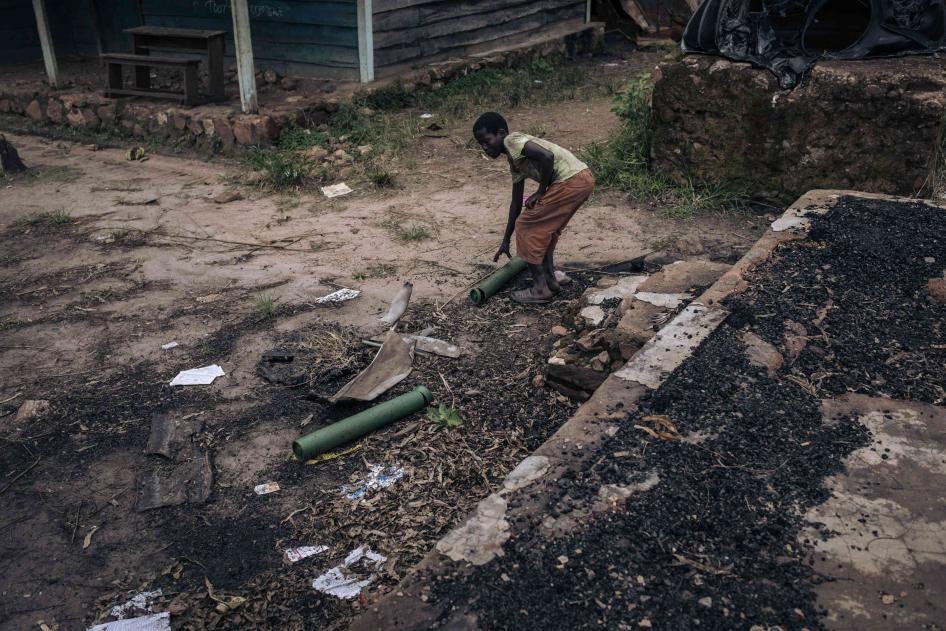The normalization of diplomatic relations between France and Rwanda, well underway in the last two years, may soon be put to the test. A new report by the United Nations Group of Experts on the Democratic Republic of Congo has accused several senior Rwandan commanders of providing support to the M23 armed group, which has left a trail of atrocities in eastern Congo.
In this context, President Emmanuel Macron’s efforts to account for France’s troubled past in Rwanda and ease relations between the two countries may clash with Paris’ responsibility, including as a permanent member of the UN Security Council, to address serious human rights abuses in eastern Congo.
The M23, an armed group created in 2012 in eastern Congo that returned to the forefront a decade later, has attacked and occupied large parts of North Kivu province. Over the past year, Human Rights Watch has interviewed over 200 people, including victims and witnesses of the rebel group’s horrific crimes. People told us that the M23 committed killings and gang rapes as they captured towns and villages. They also used forced labor and burned and destroyed houses and civilian infrastructure.
In the village of Kishishe, M23 fighters killed scores of people, who were buried in at least 14 mass graves. Renewed fighting between the M23, Congolese armed forces, and other armed groups has displaced more than one million people, pushing them into a catastrophic humanitarian situation, and adding to the continent’s biggest displacement crisis.
Three decades of tense relations
Following the publication of the UN report, France condemned Rwanda's support to the M23. But words alone aren’t enough. France needs to endorse international sanctions against Rwandan commanders and officials responsible for supporting the armed group. Any security assistance to Rwanda should be suspended until Kigali stops supporting the abusive rebels.
France and Rwanda have had three decades of tense relations since the 1994 Rwandan genocide. Ethnic Hutu political and military extremists orchestrated the genocide primarily against ethnic Tutsi. The genocide claimed more than half a million lives in a matter of months. France had backed the government in Rwanda at the time and supported and trained its military and some of the forces that went on to commit genocidal crimes. President Macron’s landmark visit to Kigali in May 2021 was the beginning of mutually beneficial business and security partnerships between the two countries.
France now relies on Rwanda’s military for security operations in northern Mozambique and the Central African Republic. Since July 2021, Rwanda has deployed thousands of security force personnel to fight an insurgency linked to the Islamic State (ISIS) in Cabo Delgado province in northern Mozambique. The conflict has resulted in huge civilian suffering and forced TotalEnergies to temporarily suspend its lucrative liquefied natural gas operations.
The Rwandan deployment has been praised for restoring apparent stability in the region, allowing thousands of displaced people to return to their home areas. TotalEnergies has also resumed its operations in Cabo Delgado. However, for Rwandan dissidents living in Mozambique, the deployment coincided with growing threats and attacks.
In Central African Republic, France withdrew its last troops in December 2022, leaving Rwanda as the main troop contributor both through the UN peacekeeping mission and a bilateral agreement.
Red lines that should not be crossed
Many governments choose to see Rwanda’s contributions to peacekeeping as distinct from its apparent complicity in atrocities in eastern Congo. But the two are inextricable. Maj. Gen. Alex Kagame, the new commander of the Rwanda Defence Force (RDF) Joint Task Force in Mozambique, was previously in charge of a division the UN Group of Experts said was responsible for an RDF attack on a Congolese army position. In their latest report, the UN investigators have pointed to the role of at least two Rwandan army commanders who were reportedly hosted by the French army chief of staff in Paris last year.
The question is whether the French government will live up to its responsibilities. Rebuilding ties with Rwanda should not come at the expense of today’s victims of atrocities in Congo. During his 2021 visit to Kigali, asking for forgiveness, Macron acknowledged France’s role in the genocide and promised “the opportunity for a respectful, lucid, united, and mutually demanding alliance.” Rwandan President Paul Kagame welcomed his speech, affirming that “The truth heals.”
The truth today is that Rwanda’s support for the M23 is beyond doubt. Rwanda has been quick to deny its implication, as it did 10 years ago, despite the evidence that just kept adding up. The UN report will nonetheless trigger discussions within the European Union and at the UN Security Council to decide whether sanctions against Rwandan commanders, M23 and other abusive rebel groups’ leaders should be put in place. France’s position could be decisive.
France should have a coherent and principled strategy when it comes to Rwanda: one that does not trade impunity for Rwanda's support to the M23 against security assistance or forgiveness for past deeds, as terrible as they may be. Macron should signal that regardless of France's historical responsibilities, there are red lines that its partners should not cross – and supporting mass atrocities is one of them.








